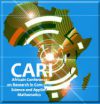 CARI 2020 at Ecole Polytechnique de Thiès (SENEGAL) — CALL FOR PAPERS
CARI 2020 at Ecole Polytechnique de Thiès (SENEGAL) — CALL FOR PAPERS
CARI (http://www.cari-info.org/), the African Conference on Research in Computer Science and Applied Mathematics, is the outcome of an international cooperation involving African universities, French research institutes, and international organizations. Occurring once every two years since its first edition held in 1992 (Yaounde, Cameroon), CARI is more than a scientific gathering, but a dynamic environment for cooperation that brings together African researchers, and decision-makers in the fields of computer science and applied mathematics. The scientific program, which reflects the wealth and diversity of the research carried out on the African continent, places special emphasis on work that can contribute to technological development, environmental awareness and natural resource management.
The conference is organized by the Institut National de Recherche en Informatique et en Automatique (INRIA), the Institut de Recherche pour le Développement (IRD), the Centre de coopération Internationale en Recherche Agronomique pour le Développement (CIRAD), the International Center for Pure and Applied Mathematics (ICPAM/CIMPA) and the Agence Universitaire de la Francophonie (AUF).
The next conference in 2020 will be hosted by Ecole Polytechnique de Thiès in Sénégal under the responsability of Prof. Oumar Niang.
The conference CARI’2020 will be preceded by a research school on the “Mathematics of Artificial Intelligence and application to Robotics and Big Data”.
Important dates:
- Opening submission site: October, 2019
- Submission deadline: January 30, 2020
- Notification of acceptance: May 15, 2020
- Final version: July 1, 2020
- Research School : October 09-13, 2020
Submitted papers have to be original works of their authors, which moreover are not simultaneously submitted to another conference or journal. CARI accepts papers witten in either French or English but strongly encourages authors to write in English. The submitted papers are in PDF and they should conform the template of ARIMA Journal (https://arima.episciences.org). The limit length of papers is 8 pages to which annexes of a maximal length of 4 pages can be added. These annexes will also be published in the proceedings.
During the selection of papers to CARI conference we will also select some best papers to be included in a special issue of ARIMA journal.
The limit length of papers do not apply to those selected for the special issue. These papers will be quickly reviewed by the Programme Committee before final acceptance for publication in the journal. They will of course also appear in a special section of CARI’s proceedings. In this way the special issue of ARIMA Journal should appear at the same or shortly after the CARI’s proceedings.
There is no inscription fees to the conference. Moreover CARI will provide support to some authors to enable them to present their accepted paper on the following conditions:
Only members from African institutions, at the time of the conference, are eligible from a financial support.
Before seeking a support from the CARI an African author should provide a document from his/her institution stating which part of the expense (eventually none) it agrees to take care of.
A senior researcher (i.e., neither Doctorate or Post-doc.) is not allowed to ask CARI to support both his travel expenses and her sejourn expenses (at least one of these should be supported by other means).
Submit your paper to one of the following tracks (also accessible from CARI website: http://www.cari-info.org/
- Computer Science: http://cari2020.irisa.fr/informatique/openconf/openconf.php
- Applied Mathematics: http://cari2020.irisa.fr/maths_appliquees/openconf/openconf.php
CARI 2020 welcomes and encourages the presentation of methodological contributions in Computer Science and Applied Mathematics. CARI 2020 will provide a forum for students and academic/industrial researchers in order to discuss the most recent trends in Computer Science and Appplied Mathematics and share innovative research directions for Africa. The CARI conference encourages to submit original and unpublished research work. Contributions covering theoretical developments or applications dedicated to African issues are invited.
CARI is divided into two tracks (Computer Science and Applied Mathematics) whose topics of interest include but not limited to the following respective lists:
- Computer Science:
– Data Management Systems
– Distributed Systems
– Wireless Networks
– Cryptography
– Cyber Security
– Safety and Correctness of Systems
– Big Data and Data Science
– Artificial Intelligence
– Machine Learning
– Knowledge Discovery and Data Mining
– Decision Making under Uncertainty
– Information Retrieval
– Natural Language Processing
– Semantic Web and Linked Data
– Ontology
– Internet of Things
– Cooperative and User Centric Systems
– Multi-Agent Systems
– Crowdsourcing
– Blockchain
– Visualisation
– Applications: Digital Agriculture, Biomedicine, Smart Cities, e-Government, etc.
- Applied Mathematics:
– Analysis of Dynamical Systems,
– Numerical Analysis
– Partial Differential Equations
– Optimization, Inverse Problems and Control
– Stochastic Systems,
– Applied Statistics and Probability
– Image and Signal Processing
– Mathematics and Machine Learning
– High Performance Scientific Computation
– Mathematical Modelling
– Mathematical Finance, Actuarial Science and Economy
– Earth Sciences and Environment
– Mathematical Biology, Ecology and Medecine
